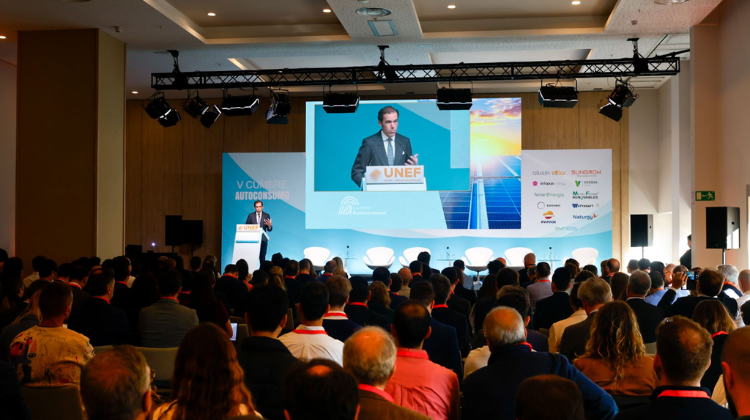Madrid today hosted the 5th Self-Consumption Summit, organised by the Spanish Photovoltaic Union (UNEF). This key event comes at a pivotal moment for the sector, marked by a slowdown in the pace of installations of such solutions.
In the face of the climate emergency and high energy prices, photovoltaic self-consumption has emerged as one of the best options available to our industry and households to reduce energy bills, achieve greater energy independence, and contribute to the decarbonisation of our country.
Photovoltaic energy, including self-consumption, is now the second-largest source of energy generation in Spain, behind wind power and ahead of nuclear. In 2024, photovoltaics accounted for 20% of the electricity mix.
On this journey, consumer commitment to self-consumption continues to grow. Last year, over 50,000 families installed self-consumption systems, adding a total of 1,182 MW of new capacity in 2024. However, growth has significantly slowed.
Rafael Benjumea, President of UNEF, stressed the importance of adopting urgent measures to return to a growth trajectory and achieve the targets set in the Integrated National Energy and Climate Plan (PNIEC).
“We have surpassed 8 GW of self-consumption, but the 31% drop in new installations in 2024 is a clear warning sign. We cannot afford to lose the momentum we have gained,” he warned.
The UNEF President was joined at the opening ceremony by Miguel Rodrigo, Director General of IDAE, who highlighted that despite the slowdown, self-consumption is still growing well above pre-crisis levels: “In 2024, 61% more was installed than in 2019,” he noted, adding that “self-consumption can help us advance more rapidly in ensuring energy equity.”
The 5th Self-Consumption Summit gathered over 350 attendees today, including professionals from leading companies in the sector and representatives from institutions such as MITECO, IDAE, CNMC, REE, and regional governments.
UNEF also presented the “Good Practice Manual on Fire Safety”, now publicly available on its website, offering key guidelines to ensure safe installation practices. The manual covers essential aspects of design, installation, and maintenance, emphasising the importance of professional training and qualifications, as well as the use of appropriate, high-quality materials and components.
A Sector with Tangible Achievements, Facing Urgent Challenges
Since the approval of Royal Decree 244/2019, self-consumption has shifted from being a marginal alternative to a common option for households, businesses, and public administrations. However, the current growth rate is insufficient to meet the target of reaching 19 GW by 2030.
The sector has identified various barriers hindering self-consumption development, ranging from regulatory inconsistencies to administrative and economic obstacles. Particular emphasis has been placed on removing unjustified limits in processing, such as the current 100 kW threshold for simplified procedures, and restrictions on the distance between generation and consumption points.
Concrete Proposals to Reactivate Self-Consumption
Throughout the sessions, a series of concrete proposals were presented to revitalise self-consumption in Spain, including:
-
Permitting: Exempt installations injecting less than 15 kW from processing requirements, extend simplified procedures to 450 kW access capacity, and increase the allowable distance between generator and consumer to 5,000 metres.
-
Promotion of Collective Self-Consumption: Streamline procedures through the introduction of a collective self-consumption manager, simplify sharing agreements, and remove unnecessary requirements such as additional meters.
-
Economic and Fiscal Measures: Increase the variable component of energy bills to encourage savings, extend tax deductions for energy efficiency, and apply reduced VAT rates to certain solar installation components, including batteries.
-
Support for Storage Solutions: Highlight their key role in system flexibility and ensure their integration into self-consumption regulations as both generators and consumers.
-
Guarantees and Territorial Equity: Ensure that distributors meet deadlines and that administrative exemptions are applied uniformly across the country.
Energy Communities and Electrification: Pillars of the Future
The summit also highlighted the role of energy communities as a new driver of the energy transition. UNEF called for a stable regulatory framework that recognises their public interest status and facilitates development by local entities.
Additionally, the need for joint action to advance the electrification of consumption was emphasised, promoting the integration of technologies such as self-consumption, storage, and heat pumps, as well as the effective implementation of the Energy Savings Certificate (CAE) system.
A Shared Vision for 2030
Benjumea concluded his address with a vision for Spain’s future: households and businesses actively managing their energy, a more competitive industry, empowered communities, more resilient grids, and reduced energy dependence.
“Self-consumption represents the Spain we aspire to: innovative, sustainable, and fair. We have the knowledge, the business network, and public support. All that remains is to complete a few regulatory pieces to finish the puzzle,” he stated.
UNEF reaffirmed its commitment to working with public administrations and all sector stakeholders to consolidate self-consumption as a cornerstone of Spain’s energy transition.





























